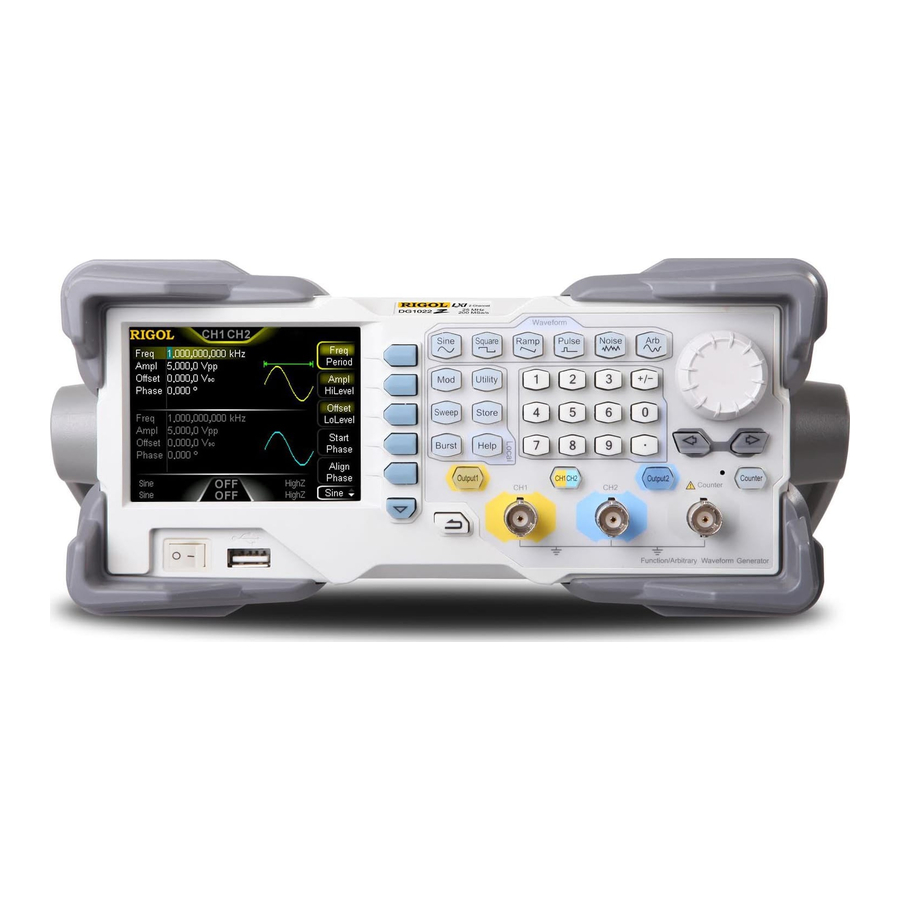
Rigol DG1062Z Calibration Manual
Function/arbitrary waveform generator
Hide thumbs
Also See for DG1062Z:
- User manual (180 pages) ,
- Manual (80 pages) ,
- Performance verification manual (55 pages)
Summary of Contents for Rigol DG1062Z
- Page 1 RIGOL Calibration Guide DG1000Z Series Function/Arbitrary Waveform Generator Feb. 2014 RIGOL Technologies, Inc.
- Page 3 Notices RIGOL products are protected by patent law in and outside of P.R.C. RIGOL reserves the right to modify or change parts of or all the specifications and pricing policies at company’s sole decision. Information in this publication replaces all previously corresponding material.
-
Page 4: Document Overview
System. Content Conventions in this Manual: DG1000Z series function/arbitrary waveform generator includes the following models. Unless otherwise noted in this manual, DG1062Z is taken as an example to introduce the calibration notices and calibration process of DG1000Z series. Model Number of Channels Max. -
Page 5: Table Of Contents
Contents RIGOL Contents Guaranty and Declaration ................. I Document Overview ................II Chapter 1 Calibration Notices ............. 1-1 Calibration Interval ................1-1 Calibration Safety .................. 1-1 To Stop the Calibration ................1-1 To Acquire the Calibration Service ............1-2 Recommended Test Devices ..............1-2 Test Notices .................. -
Page 7: Chapter 1 Calibration Notices
Chapter 1 Calibration Notices RIGOL Chapter 1 Calibration Notices Calibration Interval Regular calibration can ensure the performance specifications of DG1000Z. You are recommended to calibrate the instrument at a one-year calibration interval. You can select a proper calibration interval according to your requirement of performance accuracy. -
Page 8: To Acquire The Calibration Service
To Acquire the Calibration Service Improper calibration may result in output accuracy reduction and even output error. RIGOL does not recommend manual calibration by users. If calibration is required, please contact RIGOL customer service department or the local distributor. Recommended Test Devices It is recommended that you use the test devices listed in the table below or other test devices whose performance specifications satisfy the “Performance Requirement”... -
Page 9: Chapter 2 Calibration Process
Chapter 2 Calibration Process RIGOL Chapter 2 Calibration Process Warm DG1000Z up for at least 30 minutes. Press Utility Test/Cal Manual Cal and input the correct password using the numeric keyboard. Then, press OK to enter the calibration interface as shown in the figure below. - Page 10 RIGOL Chapter 2 Calibration Process Perform the amplitude calibration before performing the inner load calibration or offset calibration. Perform the inner load calibration before performing the high-frequency flatness calibration. 2. Cal Point Press this softkey and the specified calibration point in the ID column is highlighted (not applicable to the “Freq Accuracy”...
-
Page 11: Frequency Accuracy Calibration
Chapter 2 Calibration Process RIGOL Frequency Accuracy Calibration Make sure that DG1000Z has been warmed up for at least 30 minutes. Use a dual-BNC connecting wire to connect the channel output terminal of DG1000Z (take CH1 as an example, the calibration method is also applicable to CH2) and the signal input terminal of the frequency counter, as shown in the figure below. -
Page 12: Amplitude (Ac Amplitude) Calibration
RIGOL Chapter 2 Calibration Process Amplitude (AC Amplitude) Calibration Make sure that DG1000Z has been warmed up for at least 30 minutes. Connect the channel output terminal of DG1000Z (take CH1 as an example, the calibration method is also applicable to CH2) and the voltage input terminals of the digital mutlimeter using a BNC-Dual banana plug connecting wire, as shown in the figure below. -
Page 13: Low-Frequency Flatness Calibration
Chapter 2 Calibration Process RIGOL Low-frequency Flatness Calibration Make sure that DG1000Z has been warmed up for at least 30 minutes. Connect the channel output terminal of DG1000Z (take CH1 as an example, the calibration method is also applicable to CH2) and the voltage input terminals of the digital mutlimeter using a BNC-Dual banana plug connecting wire, as shown in Figure 2-3. -
Page 14: Offset (Output Offset) Calibration
RIGOL Chapter 2 Calibration Process Offset (Output Offset) Calibration Make sure that DG1000Z has been warmed up for at least 30 minutes. Connect the channel output terminal of DG1000Z (take CH1 as an example, the calibration method is also applicable to CH2) and the voltage input terminals of the digital mutlimeter using a BNC-Dual banana plug connecting wire, as shown in Figure 2-3. -
Page 15: Inner Load Calibration
Chapter 2 Calibration Process RIGOL Inner Load Calibration Make sure that DG1000Z has been warmed up for at least 30 minutes. Connect the channel output terminal of DG1000Z (take CH1 as an example, the calibration method is also applicable to CH2) and the voltage input terminals of the digital mutlimeter using a BNC-Dual banana plug connecting wire, as shown in Figure 2-3. - Page 16 RIGOL Chapter 2 Calibration Process b) Calibration with 50Ω load: Press Meas Val and the MeasValue column of the point selected becomes editable. At this point, use the numeric keyboard or the knob and direction keys to input the current measurement value of the digital multimeter. Press Input Val to write the measurement value into the system.
-
Page 17: High-Frequency Flatness Calibration
Chapter 2 Calibration Process RIGOL High-frequency Flatness Calibration Make sure that DG1000Z has been warmed up for at least 30 minutes. Connect the power meter and power sensor; then connect the power sensor to the output terminal of DG1000Z (take CH1 as an example, the calibration method is also applicable to CH2), as shown in the figure below. - Page 18 RIGOL Chapter 2 Calibration Process Use the knob to select the next calibration point (for each calibration point, set a proper frequency calibration factor on the power meter). Repeat steps 7 and 8 to measure the high-frequency flatness of this calibration point until finishing the calibration of all the calibration points.

















Need help?
Do you have a question about the DG1062Z and is the answer not in the manual?
Questions and answers